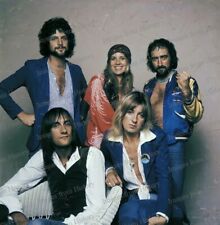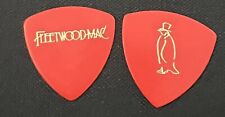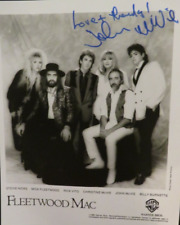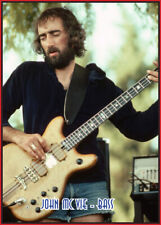|
1972
Sunny Side of Heaven? Following the release of Future Games , Fleetwood Mac went on tour, gettting top billing once again in America, with the likes of Van Morrison opening for them, and selling out various venues throughout the country. They then toured Europe, this time as an opening act for bands like Deep Purple and Savoy Brown, since both Britain and the continent were still bearing the torch for Peter Green's Fleetwood Mac, or else enthralled by the advent of "glam-rock", as best personified by David Bowie and T. Rex. During a break in this hectic schedule they recorded their next album (the second within six months), Bare Trees , and took to the road again. Bare Trees was released in the U.S. in April 1972. Not as consistent an effort as Future Games , it still had its share of fine songs, such as Christine McVie's "Spare Me A Little Of Your Love", Danny Kirwan's "Dust" (whose lyrics were lifted from the Rupert Brooke poem of the same name), and Bob Welch's "Sentimental Lady". This last song became, alongside of "Oh Well", one of the band's FM rock radio staples in these pre-Buckingham/Nicks years, and five years later became a Top 10 hit in its own right. The album even included a poetry reading, recorded by Mick Fleetwood, by one Mrs. Scarrot, one of their neighbors in Hampshire. The album cover sported a wonderful cover photograph, taken by John McVie. The U.S. pressing's jacket initially had this photo framed in a thin brown line and printed on glossy, coated paper. Later versions removed this line, "whitened-up" the contrast on the photo, and printed it on flat, unfinished paper. Despite the merits of the album, the strain of constant touring was taking its toll on the band, particularly on Danny Kirwan. He had been forced into the spotlight thanks to all the previous personnel changes and by virtue of the fact that he was the lead guitarist; Welch playing mostly rhythm at this point. And like Peter Green before him, Danny's alcohol and hallucinogenic use only augmented the problem. Still one hell of a guitarist, Kirwan became increasingly distant, often withdrawing within himself, and explosive-tempered (he once narrowly missed injuring Green in the 1971 post-Spencer tour when a pissed-off Kirwan chucked a beer bottle at him). One night, immediately before the band was to perform, he and Welch got into an argument over tuning. Kirwan stormed off, and promptly smashed his head into the bathroom wall, then, covered in blood, smashed his guitar. He refused to go on stage, forcing the band to muddle through without him, forcing Welch to play the lead parts as well. Instead of returning to their hotel, he then rather sadistically went to the mike-mixer and watched the band go through the ordeal without him, then afterwards critiqued their performance! Fleetwood, who had admittedly been the "last holdout", fired him, and the rest of the tour was cancelled. Upon returning home, the band took a break and began contemplating how best to replace Kirwan. They did not have to look very far. Since many of that era's most popular bands (Led Zeppelin, Deep Purple, and Jethro Tull to name but three) featured a strutting, aggressive lead vocalist, manager Cliff Davis thought that it would be great for Fleetwood Mac to do likewise. After some cajoling the band agreed, and found such a personality in Savoy Brown's vocalist Dave Walker, with whom they had toured earlier in the year. In 1972, Savoy Brown released two albums with Walker: Hellbound Train (which perhaps marked a commercial high point for Savoy in the States, getting as high as number 34 on the Billboard album charts) and Lion's Share (which was released after Walker had joined Fleetwood Mac). Fleetwood Mac also needed another guitarist, so they pillaged another of their tour-mates, Long John Baldry, and got Bob Weston. Although he had been touring with Baldry for some time, Weston's sole recorded output with him was the Rod Stewart-produced "You Can't Judge A Book By The Cover" (also the B-side of the "Iko-Iko" single) and "Lord Remember Me" on the Everything Stops For Tea album. Once the new guys had been drafted in the band (September 1972), the new six-piece (for the first time in its history), seventh edition of Fleetwood Mac again took to the road. 1972 also marked the end of (at least temporarily) the recording careers of Peter Green and Jeremy Spencer. Green's final release didn't even give him top billing (or U.S. release). He was teamed up with Nigel Watson again on the "Beasts Of Burden" single, a paen to man's inhumanity to his four-legged friends. Spencer, on the other hand, was able to release an entire album with his Children of God comrades, titled simply Jeremy Spencer And The Children . A predictable collection of wide-eyed religious songs from the burned-out Spencer.
|









